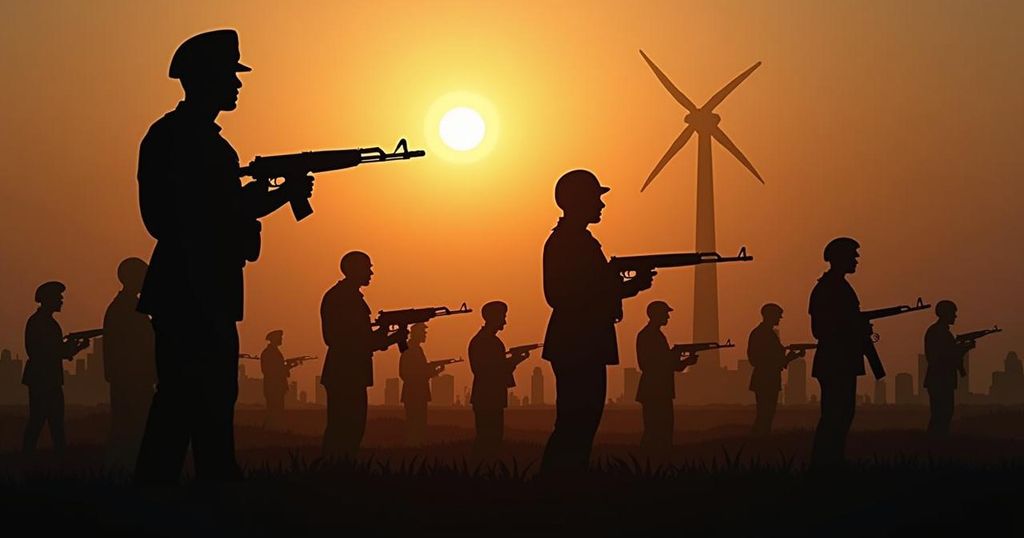The death of Hezbollah leader Hassan Nasrallah during an Israeli airstrike on Beirut has prompted widespread reactions across the Middle East. Hezbollah, Iran, and other groups have condemned the attack, while the U.S. has supported Israel’s actions. The situation reflects ongoing geopolitical tensions, with potential repercussions for regional stability.
In the aftermath of Hezbollah leader Hassan Nasrallah’s death in an Israeli airstrike on Friday, a wide range of responses has emanated from across the Middle East. The attack targeted the southern suburbs of Beirut, employing approximately 80 bombs, including specialized munitions aimed at infiltrating fortified structures. The Lebanese Health Ministry reported at least 11 fatalities and over 100 injuries from the strikes. Additionally, Abbas Nilforoushan, the deputy commander of Iran’s Islamic Revolutionary Guard Corps, was reported killed in the operation, underscoring the strike’s high-profile nature. Hezbollah, reflecting on Nasrallah’s leadership spanning nearly 30 years, mourned him as a “brave martyr.” The Israeli military characterized the operation, named New Order, as a significant setback for Hezbollah’s command hierarchy. Israeli Defense Minister Yoav Gallant termed Nasrallah a “master murderer” and emphasized the operation’s historical significance. Iran’s Supreme Leader Ayatollah Ali Khamenei rapidly condemned the strike, advocating for united Muslim support for Hezbollah against Israel’s agenda, asserting, “The fate of this region will be determined by the forces of resistance.” In solidarity, Hamas described the airstrike as a “cowardly act of terrorism” and condemned the violence inflicted by what they termed the “Zionist regime.” Yemen’s Houthis expressed that Nasrallah’s death would enhance communal resolve, while Lebanon’s caretaker Prime Minister Najib Mikati instituted a three-day mourning period, underlining the imminent threat facing the country. The former Lebanese President, Michel Aoun, lamented the loss of a leader dedicated to national liberation and resistance. Turkish President Recep Tayyip Erdogan criticized Israeli actions without explicitly naming Nasrallah, labeling them reckless and in violation of international norms. Additionally, Iraq and Syria announced a period of public mourning for Nasrallah, with the Iraqi Prime Minister commenting on the assassination as a “criminal act” that crossed unacceptable lines. Contrastingly, social media footage revealed celebrations in rebel-held areas of Syria, indicating a complex reception of Nasrallah’s death. Meanwhile, the U.S. government, through President Biden, deemed the strike a “measure of justice” for numerous victims, reinforcing support for Israel’s defensive posture against perceived threats from Hezbollah and other Iranian-supported entities. Vice President Kamala Harris reiterated this position, emphasizing unwavering commitment to Israel’s security. In response to the attack, Hezbollah retaliated by launching approximately 90 rockets into northern Israel, further escalating regional tensions. As the conflict continues, the overall death toll resulting from Israel’s operations in Lebanon has surpassed 700 individuals, leaving the situation increasingly precarious.
Hassan Nasrallah, the leader of Hezbollah, held significant influence in the Middle East and was a central figure in the Iranian-backed militant group’s operations. His leadership spanned nearly three decades, during which Hezbollah emerged as a formidable force in regional politics and military engagements, particularly against Israel. The recent airstrike on Nasrallah marked a pivotal moment, as it came amid increased Israeli military offensives aimed at reducing Hezbollah’s operational capabilities. The reactions to his death reflect deeper geopolitical rifts and alignments, particularly involving Iran and its allies, alongside responses from Western nations that recognize Israel’s right to defense.
The death of Hassan Nasrallah has catalyzed a broad spectrum of reactions throughout the Middle East, from mourning and calls for resistance to expressions of solidarity against Israel. The incident elucidates not only the ongoing tensions in the region but also the complex interplay of alliances and rivalries that define Middle Eastern geopolitics. As Hezbollah retaliates and regional leaders respond, the broader implications for stability, security, and international relations continue to unfold, demanding close monitoring of developments.
Original Source: www.al-monitor.com






